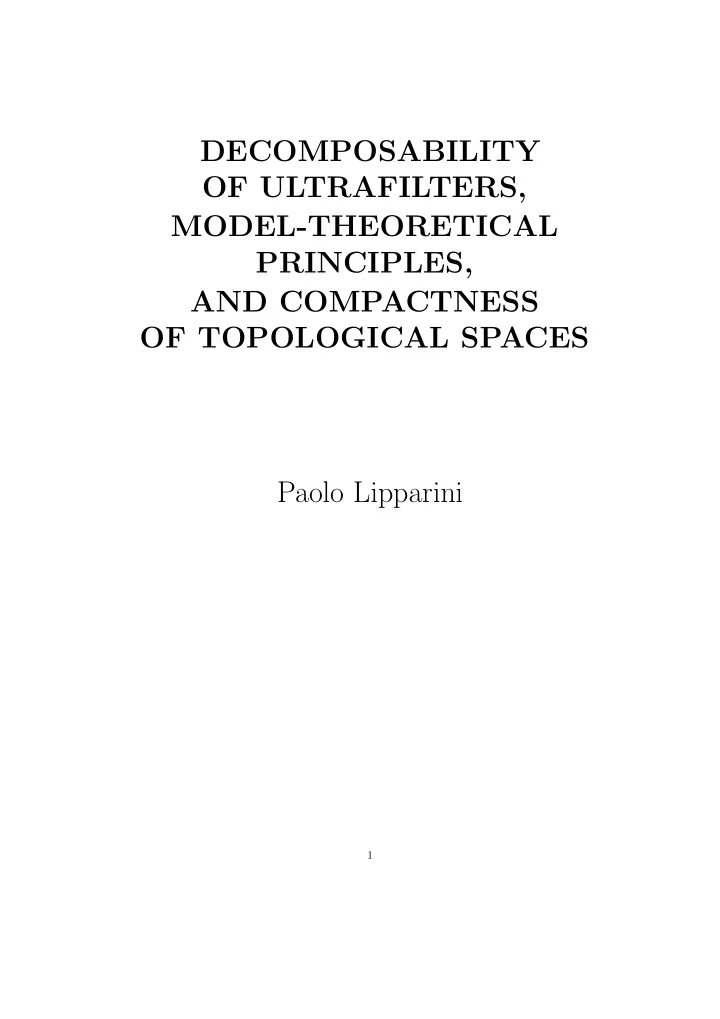

DECOMPOSABILITY OF ULTRAFILTERS, MODEL-THEORETICAL PRINCIPLES, AND COMPACTNESS OF TOPOLOGICAL SPACES Paolo Lipparini 1
2 Let µ , λ and κ be infinite cardinals. Definition 1. An ultrafilter D over λ is said to be µ - decomposable if and only if there exists a function f : λ → µ such that whenever X ⊆ µ and | X | < µ then f − 1 ( X ) �∈ D . If a function f as above exists, it is called a µ - decomposition for D . In other words, an ultrafilter D is µ -decomposable if and only if some quotient of D is uniform over µ .
3 It easy to see that a cardinal λ is measurable if and only if there exists some ultrafilter D uniform over λ such that D is not µ -decomposable, for every µ < λ . Thus, the existence of indecompos- able ultrafilters can be seen as a weak- ening of measurability (they usually yield measurable cardinals in inner models, anyway). Decomposable ultrafilters and their applications have been studied (some- times under different terminology) by Silver, Kunen, Prikry, Cudnovskii, Ketonen, Magidor, Donder, Makowski, Shelah, among many others.
4 In particular, the following princi- ple: A ( λ, µ ) “ Every ultrafilter uniform over λ is µ -decomposable ” has applications to appropriately de- fined compactness properties of log- ics extending first-order logic, and to compactness properties of products of topological spaces. We shall introduce a variation on A ( λ, µ ) which furnishes stronger ap- plications and involves more natural notions of compactness.
5 A ( λ, µ ) means that for every ultra- filter D uniform over λ there exists f : λ → µ which is a µ -decomposition for D . We can introduce a more refined notion. κ ⇒ µ means that Definition 2. λ there is a family F of functions from λ to µ such that | F | = κ and for every ultrafilter D uniform over λ there exists f ∈ F which is a µ - decomposition for D . κ Clearly, if κ ≥ 2 λ then λ ⇒ µ is equivalent to A ( λ, µ ).
6 For κ < 2 λ , λ κ ⇒ µ is a notion con- nected with variations on weak com- pactness rather than measurability. Just to give the flavour of the strength of this notion, if λ is the first weakly compact cardinal, then: A ( λ, ω ) trivially holds, while λ λ ⇒ ω fails.
7 Theorem 3. Suppose that λ ≥ µ are infinite regular cardinals, and κ ≥ λ is an infinite cardinal (the assumption λ and µ regular is just for convenience: a version of the result holds for arbitrary cardinals). The following conditions are equiv- alent. (a) λ κ ⇒ µ holds. (b) (topological version) Whenever ( X β ) β<κ is a family of topological spaces such that no X β is [ µ, µ ] - compact, then X = � β<κ X β is not [ λ, λ ] -compact.
8 (c) (alternative topological version) The topological space µ κ is not [ λ, λ ] - compact, where µ is endowed with the topology whose open sets are the intervals [0 , α ) ( α ≤ µ ), and µ κ is endowed with the Tychonoff topology. (d) (Ulam matrices-like version) There is a family ( B α,β ) α<µ,β<κ of subsets of λ such that: (i) For every β < κ , � α<µ B α,β = λ ; (ii) For every β < κ and α ≤ α ′ < µ , B α,β ⊆ B α ′ ,β ; (iii) For every function g : κ → µ there exists a finite subset F ⊆ κ such that | � β ∈ F B g ( β ) ,β | < λ .
9 (e) (model-theoretical version) The model � λ, <, γ � γ<λ has an expan- sion A in a language with at most κ new symbols such that whenever B ≡ A and B has an element x such that B | = γ < x for every γ < λ , then B has an element y such that B | = α < y < µ for ev- ery α < µ . It is almost certain that there is a condition equivalent to the ones above involving compactness of log- ics extending first-order logic. This is true both for κ ≥ 2 λ and for κ = λ ; I have not checked the intermedi- ate cases.
Recommend
More recommend